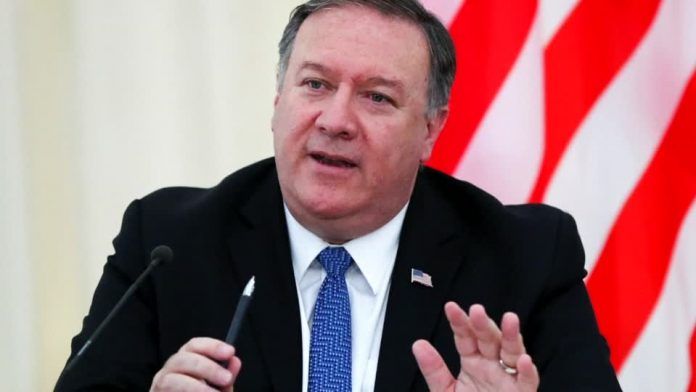By Arshad Mohammed and Daphne Psaledakis
WASHINGTON, Jan 7 (Reuters) – Secretary of State Mike Pompeo appeared on Tuesday to further distance himself from his assertion last week that Iranian General Qassem Soleimani planned imminent attacks on U.S. targets before he was killed in a U.S. drone strike.
The killing on Friday of the military commander, who headed Iran‘s elite Quds Force and built up Tehran’s network of proxy armies in the region, prompted Iranian threats of retaliation and fueled expectations that a wider war could erupt.
Speaking within hours of the drone strike, Pompeo told CNN on Friday that “last night was the time that we needed to strike to make sure that this imminent attack that he was working actively was disrupted.”
However, appearing before reporters in the State Department briefing room on Tuesday, and in six TV interviews on Sunday, he did not use the word “imminent” to justify the U.S. decision on to kill Soleimani.
While Defense Secretary Mike Esper on Tuesday said it was “more fair” to say the attack Soleimani was planning was to be executed in days rather than weeks, Pompeo avoided specifying a timeline.
Pompeo also held Soleimani responsible for a Dec. 27 rocket attack in Iraq in which a U.S. civilian contractor was killed and cited it as justifying the expectation of future attacks.
[aesop_image img=”https://kayhanlife.com/wp-content/uploads/2020/01/2020-01-03T040023Z_2129447706_RC248E9MPS0R_RTRMADP_3_IRAQ-SECURITY-BLAST-2-scaled.jpg” panorama=”off” credit=”Combination of file photos showing (L) Abu Mahdi al-Muhandis, a commander in the Popular Mobilization Forces, attending a funeral procession of Hashd al-Shaabi (paramilitary forces) members, who were killed by U.S. air strikes in Qaim district, at the Green zone in Baghdad, Iraq December 31, 2019 and (R) Iranian Revolutionary Guard Commander Qassem Soleimani standing at the frontline during offensive operations against Islamic State militants in the town of Tal Ksaiba in Salahuddin province March 8, 2015. REUTERS/” align=”center” lightbox=”off” captionsrc=”custom” captionposition=”left” revealfx=”off” overlay_revealfx=”off”]
“We know what happened … in December, ultimately leading to the death of an American. So, if you are looking for imminence, you need look no further than the days that led up to the strike that was taken against Soleimani,” Pompeo said on Tuesday.
“And then you in addition to that have what we could clearly see were continuing efforts on behalf of this terrorist to build out a network of campaign activities that were going to lead, potentially, to the death of many more Americans,” he added.
Speaking to CNN on Friday, Pompeo was more emphatic, saying Soleimani’s death “saved American lives.”
The State Department did not immediately respond to a request for comment on whether Pompeo was distancing himself from his prior statements that Soleimani planned “imminent” attacks on U.S. targets.
U.S. President Donald Trump’s administration has not made public any specific intelligence justifying his decision to kill Soleimani, though administration officials are scheduled to hold a classified briefing with member of Congress on Tuesday.
Speaking ahead of the briefing, a congressional source said that intelligence committee members had not yet received any information to suggest that an attack was imminent.
Within hours of the attack, some U.S. national security and congressional officials had raised questions about the use of the word “imminent” to justify the killing.
Mark Warner, the Democrat who serves as vice chair of the Senate Intelligence Committee, told Reuters on Friday after a briefing: “I believe there was a threat, but the question of how imminent is still one I want answered.”
The word “imminent” implies attacks against American targets were about to happen and could help the Trump administration make a legal argument that killing Soleimani was an act of self-defense.
(Reporting by Arshad Mohammed and Daphne Psaledakis; Additonal reporting by David Brunnstrom, Susan Heavey, Patricia Zengerle and Mark Hosenball; Writing by Arshad Mohammed and Tim Ahmann; Editing by Lisa Shumaker)


